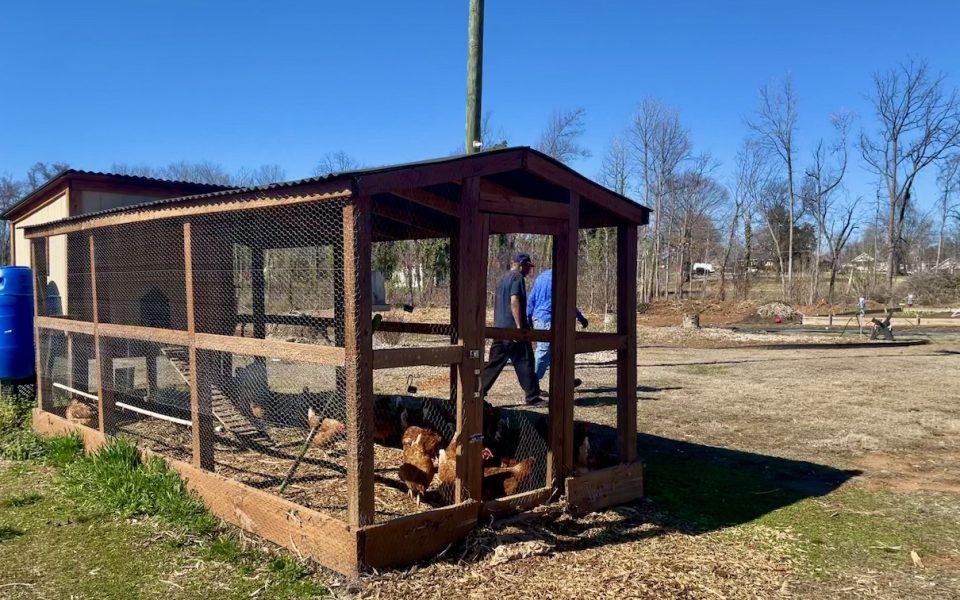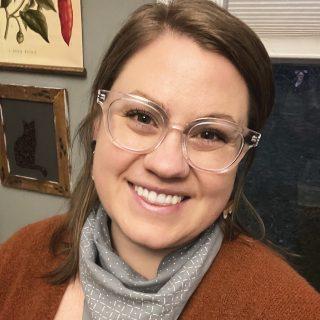Featured photo: A chicken coop at the Carter G Woodson farm. (photo by Kaitlynn Havens)
A pregnant calico scampers from an apartment complex, windows half covered with blankets, the others boarded with the last decade’s lumber. Next to it, nestled between Winston Salem’s Sunnyside and Waughtown neighborhoods and the intersection of Interstate 40 and Highway 52, is the Carter G Woodson School, and its urban farm.
Curtis McLaurin, a retired Winston-Salem sanitation worker and self-taught farmer, began his work at Carter G Woodson School in 2015 as the school’s bus supervisor. But since 2018, he has been working to teach both his students and the community about the benefits of backyard farming and gardening.
“The main focus of all of this is to teach self-sustainable living,” he says. “What we do here, you can do in your backyard, on a small scale. All you need is a potter. You can grow a lot, more than enough for your family. But it’s just too easy to go to Food Lion or Walmart.”

On the 22-acre farm, “Mister Curtis,” his students — all from Carter G Woodson — and the few community volunteers he can convince to stay through the heat, grow peaches, figs, pears, apples, a variety of greens, zucchini, okra, cucumber and tomatoes. A coop assembled in the center of the space houses Long Island Red chickens; a newly cleared corner is the future site of a goat farm. Unlike many of the farmer’s markets or vegetable stands scattered throughout Winston-Salem, the Carter G Woodson Farm sells their produce directly from the ground to the neighborhood in which it operates. McLaurin proposed the idea of a garden after the school had several acres of kudzu removed from the property.
“A light went off in my head, immediately,” he says. “I started seeing what you see here. A vegetable garden, a flower garden, fruit trees.”
“This is meticulous,” he continues, holding up a germination tray that K-12 students will fill with seeds and maintain through the beginning of spring. “You dig down eight feet. Lay down a pipe, like a coil. A small fan pulls the heat out of the greenhouse and sends it out through the pipe. It’s called thermal ground heating.”
McLaurin uses these science, economics and self-sustainability experiments to motivate and inspire his predominantly Black and Hispanic students. According to the US Department of Agriculture, Black farmers make up less than 2 percent of more than 3 million producers. But McLaurin hopes that starting them early can develop a passion for gardening for a lifetime.
“Kindergarten through 6th grade [students] like the dirt,” he says. “You can’t get them out. After that, they have other interests. And they don’t want to work in the heat for free. We’ve got more competition now, other electives. The arts programs and computers, social media, gaming. Our hope is to get minorities back into farming.”
McLaurin reflects on his own past of cultivation. He explains how his great-grandparents operated a small garden.

“It was not even a fifth of this size,” he recalls. “They had hogs, chickens, and a garden. When we went there, we had to slop the hogs, feed the chickens and work in the garden. I got to like it.”
McLaurin says he started his own home garden over 30 years ago by watching YouTube videos and taking advantage of resources at NCA&T State University and the North Carolina Cooperate Extension, which assists North Carolina residents interested in agricultural development.
And as he watches his students dig their hands into the dirt, he reflects on how far the project, once just a seed, has become a self-sustaining reality. What was previously a parking lot is now a drop-off location holding three years’ worth of decomposed leaves, obtained entirely from the city’s triannual leaf pickup, to be used as compost. The farm’s anti-pesticide methods of pest control involve a home concoction of beer, molasses, mouthwash, ammonia, cola, and soaked tobacco — a recipe McLaurin shares with pride.
For the future, McLaurin’s aspirations include solar panels over the chicken coop, access to water via the creek that runs under Interstate 40, approval from the city’s agriculture grants and maybe one day, enough kudzu-cleared land for a cow.
Until then, he demonstrates his lessons of self and community sustainability with a small neighborhood vegetable stand, operating in the spring and by sending as many students as possible home with bags of their harvest.
“I try to teach who want to be taught,” he says. “I try to make it interesting. That you can do this on your own.”
Visit the farm at 437 Goldfloss Street in Winston-Salem. To learn more, contact [email protected].
Join the First Amendment Society, a membership that goes directly to funding TCB‘s newsroom.
We believe that reporting can save the world.
The TCB First Amendment Society recognizes the vital role of a free, unfettered press with a bundling of local experiences designed to build community, and unique engagements with our newsroom that will help you understand, and shape, local journalism’s critical role in uplifting the people in our cities.
All revenue goes directly into the newsroom as reporters’ salaries and freelance commissions.


Leave a Reply